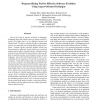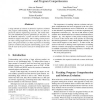166
click to vote
IWPSE
2003
IEEE
15 years 7 months ago
2003
IEEE
One of the issues in software evolution is debugging. Debugging large and complex software systems evolved requires a lot of effort since it is very difficult to localize and ide...
IWPC
2003
IEEE
15 years 7 months ago
2003
IEEE
A large amount of research is devoted to software evolution and program understanding, but these topics are often neglected in software engineering curricula. The CCSE initiative ...
103
click to vote
ICSM
2003
IEEE
15 years 7 months ago
2003
IEEE
Version control and bug tracking systems contain large amounts of historical information that can give deep insight into the evolution of a software project. Unfortunately, these ...
105
click to vote
SEKE
2004
Springer
15 years 7 months ago
2004
Springer
A typical software development team leaves behind a large amount of information. This information takes different forms, such as mail messages, software releases, version control ...
117
click to vote
ECOOP
2004
Springer
15 years 7 months ago
2004
Springer
Mechanisms in AOP (aspect-oriented programming) can be characterized by a JPM (join point model). AOP is effective in unanticipated software evolution because crosscutting concer...
110
click to vote
ECOOP
2005
Springer
15 years 7 months ago
2005
Springer
Abstract. The term “software evolution” is generally used as an analogy for biological evolution. This paper explores that analogy in more depth, analyzing software evolution f...
114
Voted
ECOOP
2005
Springer
15 years 7 months ago
2005
Springer
Abstract. The authors of this paper have all developed a framework that allows runtime adaptation of software systems. Based on our experiences, we wish to summarize common pitfall...
134
click to vote
ECOOP
2005
Springer
15 years 7 months ago
2005
Springer
Abstract. Starting from the advantages of using Feature-Oriented Programming (FOP) and program families to support software evolution, this paper discusses the drawbacks of current...
108
click to vote
SAC
2005
ACM
15 years 7 months ago
2005
ACM
In this paper, we have briefly explored the aspect-oriented approach as a tool for supporting the software evolution. The aim of this analysis is to highlight the potentiality an...
102
click to vote
WCRE
2005
IEEE
15 years 7 months ago
2005
IEEE
It is a common understanding that identifying the same entity such as module, file, and function between revisions is important for software evolution related analysis. Most softw...




